This story is the first in a weeklong series on Gallup.com on Americans' views on the role and performance of government.
PRINCETON, NJ -- A record-high 81% of Americans are dissatisfied with the way the country is being governed, adding to negativity that has been building over the past 10 years.
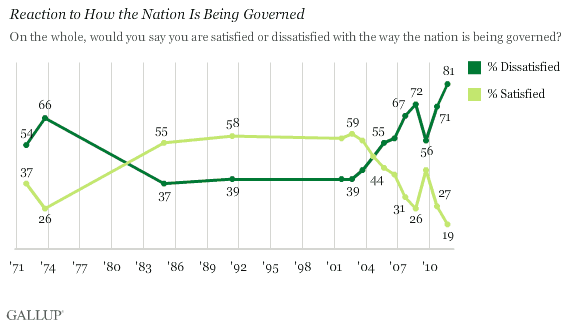
Majorities of Democrats (65%) and Republicans (92%) are dissatisfied with the nation's governance. This perhaps reflects the shared political power arrangement in the nation's capital, with Democrats controlling the White House and U.S. Senate, and Republicans controlling the House of Representatives. Partisans on both sides can thus find fault with government without necessarily blaming their own party.
The findings are from Gallup's annual Governance survey, updated Sept. 8-11, 2011. The same poll shows record or near-record criticism of Congress, elected officials, government handling of domestic problems, the scope of government power, and government waste of tax dollars.
Key Findings:
- 82% of Americans disapprove of the way Congress is handling its job.
- 69% say they have little or no confidence in the legislative branch of government, an all-time high and up from 63% in 2010.
- 57% have little or no confidence in the federal government to solve domestic problems, exceeding the previous high of 53% recorded in 2010 and well exceeding the 43% who have little or no confidence in the government to solve international problems.
- 53% have little or no confidence in the men and women who seek or hold elected office.
- Americans believe, on average, that the federal government wastes 51 cents of every tax dollar, similar to a year ago, but up significantly from 46 cents a decade ago and from an average 43 cents three decades ago.
- 49% of Americans believe the federal government has become so large and powerful that it poses an immediate threat to the rights and freedoms of ordinary citizens. In 2003, less than a third (30%) believed this.
Congress' Ratings Have Plunged in Recent Years
Confidence in Congress hit a new low this month, with 31% of Americans saying they have a great deal or fair amount of confidence in the legislative branch, lower than the percentage confident in the executive (47%) or judicial (63%) branch. Confidence in the legislative branch is slightly higher among Republicans than among Democrats, 41% vs. 32%.
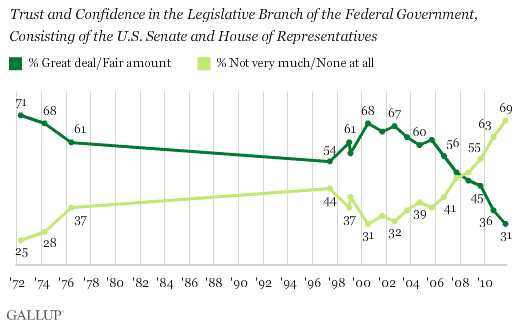
Apart from a brief rally in public approval of Congress after the 9/11 attacks, Congress' job approval rating has followed a similar path, declining sharply since about 2000. The 15% of Americans approving of Congress in the September poll is just two percentage points above the all-time low reached twice in the past year.
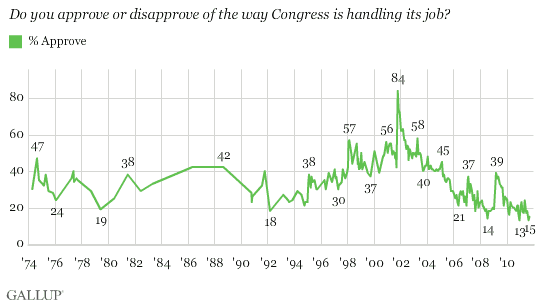
Public Officials Held in Low Esteem
Americans' confidence in the people who run for or serve in office is also at a new low; however, the decline has been more recent, dropping from 66% in 2008 to 49% in 2009 and 45% today. For most of the history of this trend, Americans had much more positive views of those seeking or holding public office, but that changed in 2009, and the balance of opinion has since remained more negative than positive.
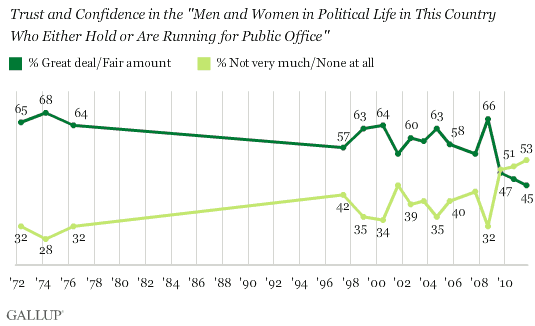
Americans Particularly Critical of Domestic Policy
At 43%, fewer Americans today than at any time in the past four decades say they have a great deal or fair amount of trust in the federal government to handle domestic problems. That is significantly lower than the 58% average level of confidence Gallup has found on this since 1972, including a 77% reading shortly after the 9/11 attacks. Gallup did not ask the question between 1976 and 1997, however, and thus may have missed low points during the recessions that occurred in the early 1980s or at the time of the House banking scandal in the early '90s.
By contrast, faith in Washington to handle international problems (57%) is currently better than the 51% all-time low recorded in 2007, during the Iraq war, and not far off from the 65% average seen since 1972.
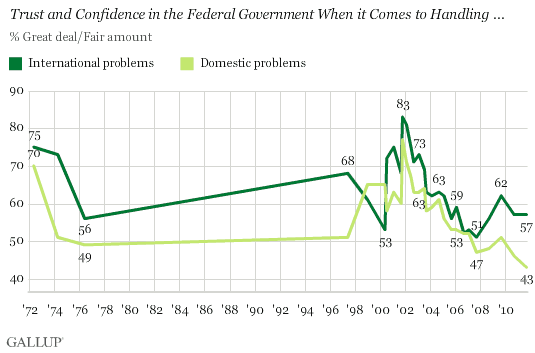
Along with Americans' record-low confidence in the federal government on domestic policy, Gallup finds record skepticism about government waste. As previously reported, Americans, on average, think the federal government in Washington wastes 51 cents of every tax dollar, the highest estimated proportion of waste Gallup has found on this measure in trends dating to 1979.
Nearly Half Now Say Government Poses Immediate Threat
Americans' sense that the federal government poses an immediate threat to individuals' rights and freedoms is also at a new high, 49%, since Gallup began asking the question using this wording in 2003. This view is much more pronounced among Republicans (61%) and independents (57%) than among Democrats (28%), although when George W. Bush was president, Democrats and independents were more likely than Republicans to view government as a threat.
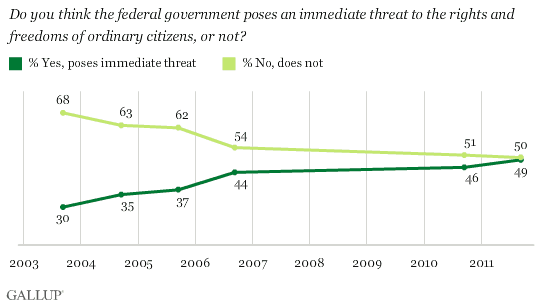
Bottom Line
Americans' various ratings of political leadership in Washington add up to a profoundly negative review of government -- something that would seem unhealthy for the country to endure for an extended period. Nevertheless, with another budget showdown looking inevitable and a contentious presidential election year getting underway, it appears the ratings reviewed here could get worse before they improve.
Survey Methods
Results for this Gallup poll are based on telephone interviews conducted Sept. 8-11, 2011, with a random sample of 1,017 adults, aged 18 and older, living in all 50 U.S. states and the District of Columbia.
For results based on the total sample of national adults, one can say with 95% confidence that the maximum margin of sampling error is ±4 percentage points.
Interviews are conducted with respondents on landline telephones and cellular phones, with interviews conducted in Spanish for respondents who are primarily Spanish-speaking. Each sample includes a minimum quota of 400 cell phone respondents and 600 landline respondents per 1,000 national adults, with additional minimum quotas among landline respondents by region. Landline telephone numbers are chosen at random among listed telephone numbers. Cell phone numbers are selected using random-digit-dial methods. Landline respondents are chosen at random within each household on the basis of which member had the most recent birthday.
Samples are weighted by gender, age, race, Hispanic ethnicity, education, region, adults in the household, and phone status (cell phone only/landline only/both, cell phone mostly, and having an unlisted landline number). Demographic weighting targets are based on the March 2010 Current Population Survey figures for the aged 18 and older non-institutionalized population living in U.S. telephone households. All reported margins of sampling error include the computed design effects for weighting and sample design.
In addition to sampling error, question wording and practical difficulties in conducting surveys can introduce error or bias into the findings of public opinion polls.
For more details on Gallup's polling methodology, visit www.gallup.com.
